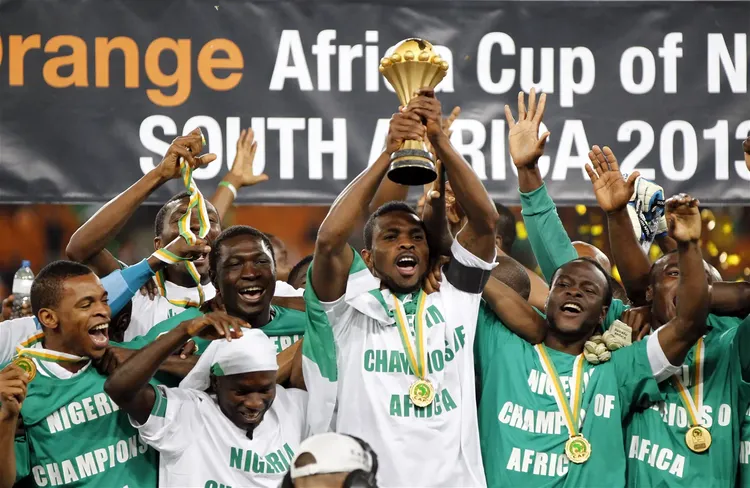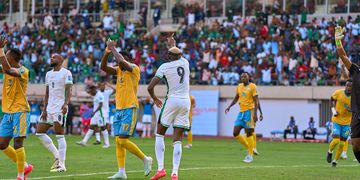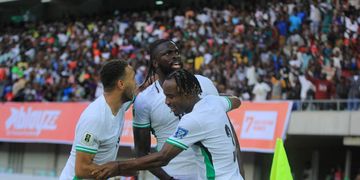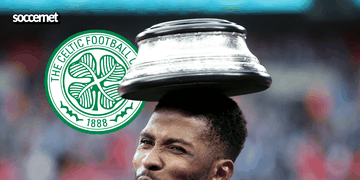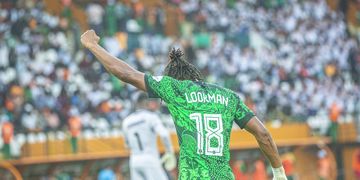As the Super Eagles take on South Africa for a place in the final of Afcon 2023, the memories of their last title victory at the home of their opponents can inspire us to victory
A Facebook memory from 11 years ago prompted me to re-examine the road to Nigeria's victory at the 2013 Africa Cup of Nations in South Africa. The picture that the app brought to remembrance was me standing beside the pitch of the Moses Mabhida Stadium in Durban, behind me a horde of journalist colleagues, as the Super Eagles trained ahead of their semifinal clash against Mali on February 6, 2013.
Nigeria's road to that Afcon victory was a long one. It started in Nelspruit, Mpumalanga, where they opened their campaign with a 1-1 draw against Burkina Faso. I arrived in the city just hours before the game and failed to secure my media accreditation tag. I was forced to buy a ticket on the open market to watch the game. The result left many Nigerian fans unhappy.
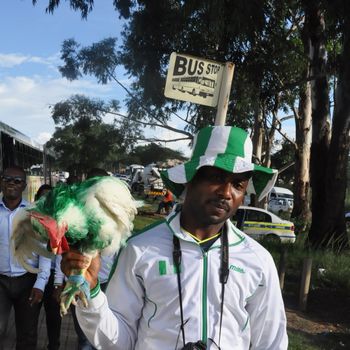
There was little belief in Stephen Keshi's squad before the tournament. I recall having travelled in a bus from Johannesburg alongside two South Africa-based Nigerians. One of the men carried a live chicken with green painted on both sides of its white plumes. It was a symbol of the “Super Chickens” appellation that the team had earned after a series of blunders over the years.
By the next game against Zambia, I had secured accreditation and watched from the media tribune inside Mbombela Stadium as the Eagles once again managed to draw 1-1 with Zambia after Ogenyi Onazi conceded a late penalty that was scored by goalkeeper Kennedy Mwene. John Obi Mikel had missed a first-half penalty before he created an assist for Emmanuel Emenike to score in the second half.
In the mixed zone, I asked Keshi if there was a problem with discipline in his squad, considering the manner in which they lost the advantage in both of their first two matches. The coach was not happy with my question and lashed out, and said that I was one of the journalists that were trying to destroy the work he was doing.
Next stop, Rustenburg
After two draws, Nigeria needed a win to avoid exiting the tournament in the group stage. It would have been a disaster of untold proportions. The final group game was to take place in Rustenburg at the Royal Bafokeng Stadium against Ethiopia. And in stepped Victor Moses with a brace to win it for the Super Eagles. It was the game he announced himself to the continent.
Nigeria had scaled through, with Burkina Faso on five points each. However, with an inferior goals difference, the Eagles finished second in the group and were going to meet Cote d'Ivoire in the quarter finals (note, the Afcon was a 16-team tournament at the time). The Elephants had topped their group against Togo, Algeria and Tunisia. They won two and drew one game and looked like the champions in waiting.
Their star line up of Didier Drogba, Salomon Kalou, Yaya Toure, Gervinho and co. left Nigeria in panic mode. Everyone had given up on Keshi's team, the NFF had issued return tickets to the players so that they could find their way back to their clubs after the game. Some members of the NFF board were already speaking with Herve Renard, recently eliminated coach of Zambia, to take over Keshi's job.
But on that Sunday afternoon in Rustenburg, Nigeria's Eagles soared back to life and won 2-1 by playing their best game of the tournament. It was the day that Sunday Mba took his place in Nigerian football folklore.
There was unbelief in the stands as Keshi's boys turned on the style and outpassed, out-thought and out-performed the illustrious Ivorians. I remember looking at Calvin Emeka Onwuka with awe at the performance of the boys.
The road to Durban
The next day, alongside two journalists who worked for Complete Sports at the time, we made our way to Johannesburg. We stayed at an inn before catching the night bus to Durban. The city on the Indian Ocean was where Nigeria would face off with Mali in the semifinals.
The journey to Durban was interesting. It was the only time we traveled by night. It was an Intercape double-decker that slowly maneuvered its way through the lights of towns and villages. The passenger that sat opposite me was a Zambian lady who told me of her happiness at the early elimination of her country from the Afcon. Many Zambians died, she told me, during the celebrations of their Afcon title win the previous year. She felt that her compatriots would be spared of unnecessary death from joyous celebrations. It reminded me of the Yoruba adage that ise kii pani, ayo ni n pani (travail doesn't kill, but over-exuberance does).
In Durban, I found accommodation in an old motel. It was very different from Nelspruit, where I had roomed with a local family in the townships. Durban's beachside high-rises gave the city a different cosmopolitan vibe; the life there was different. It was fast-paced like Port Harcourt, but Lagos was more frenetic.
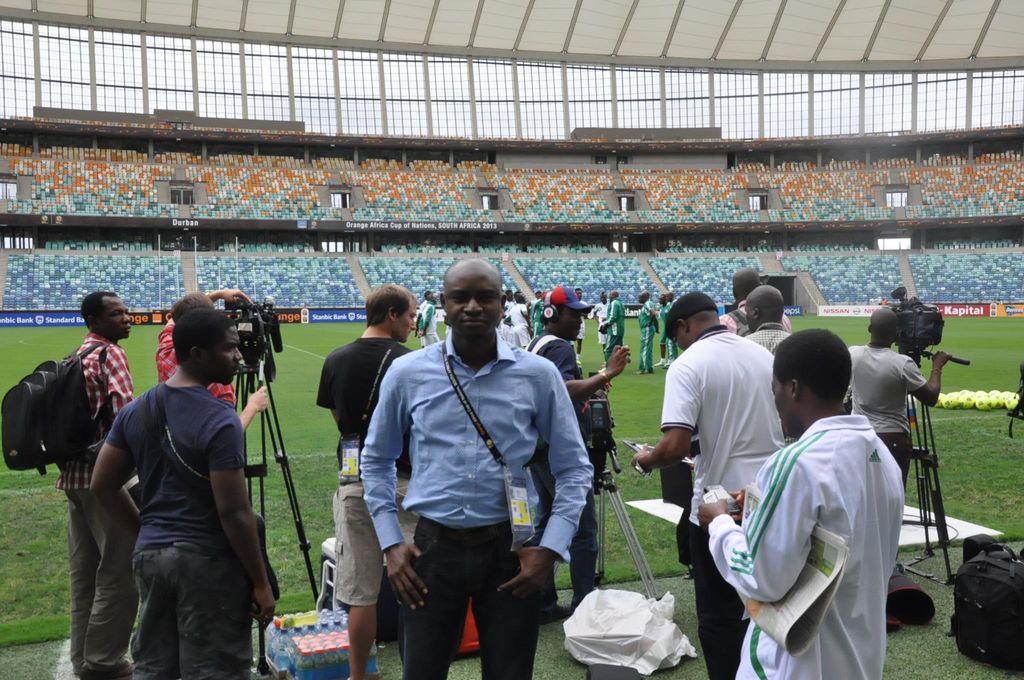
The Moses Mabhida Stadium lay like a majestic bowl, its arch reminiscent of Wembley. It was one of the most beautiful stadiums I had ever seen in Africa. While Mbombela's pitch was dry and dusty, Mabhida was lush green and well cared for because it was the home ground of PSL side AmaZulu FC. It was the venue where Yakubu Aiyegbeni infamously missed a sitter against South Korea that confirmed Nigeria's elimination from the 2010 FIFA World Cup.
The nightlife of Durban was slow in the middle of the week when we arrived. The nightclub underneath our lodge was empty the night before the game. But there was a police raid nearby. We watched from our seventh-floor window as many police cars besieged a building, their red and blue lights flashing through the night.
The game against Mali
Mali's strength was built on their midfield. Seydou Keita was their star man. He came to the press conference wearing the most flashy wristwatch I had ever seen a footballer wear in a pre-match press conference. The young man who lit up the FIFA U20 World Cup Nigeria '99 had made good playing in Spain, and he was not afraid to show off his bling.
But Stephen Keshi knew that team like the palm of his hand and tore them apart. 4-1 it ended on February 6. We were all amazed at the clinical finishing exhibited by the team after the caution exhibited against Ivory Coast in the previous game.
Once that victory was achieved, it was on to the next, the final in Johannesburg. And we all had a feeling that the Super Eagles would win their third Afcon title against Burkina Faso. It did happen. It was tough, but it happened, and those boys have become etched in the history books even though many continue to disrespect them by claiming that they were not as good as the team of '94.
And then comes South Africa
As this Afcon has mirrored the journey of Keshi's team in South Africa eleven years ago, it is safe to say that Nigeria is in a good place mentally to defeat South Africa in Bouake. The early lack of faith in Jose Peseiro's team and the struggle against Equatorial Guinea have set up the Super Eagles to become a deadly team.
South Africa also has a very good team and a goalkeeper in Ronwen Williams, who could be named goalkeeper of the tournament. But Nigeria will be too much for them going forward, and having a compact defense that has let in just one goal all tournament long. As we won the title in South Africa a decade ago, I think South Africa will usher us into another victorious run this time.
At the beginning of the tournament, I declared that I didn't have faith in this Nigeria team. But now, I believe. O Lord, help my unbelief.


